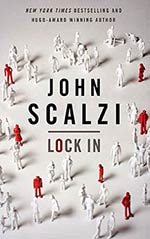
![]() verkisto
verkisto
7/26/2016
![]()
To give an idea of what to expect from this book, let me just say that I started this book at 3:00PM and finished it at 9:30PM in the same day. This isn't unusual for a John Scalzi book, but if you're new to him, know that you might want to wait until you have a chunk of uninterrupted time.
I like Scalzi's writing. A lot. I traveled about two hours a couple of months ago to see him speak. So I'm not surprised that Lock In is a readable, engaging, well-populated novel. I am impressed with the scope of the book, though. It touches on some heavier issues, and while the novel isn't all about those issues, the fact that he was able to bring something deeper and more significant to the story was new to me.
The premise of the novel is that a disease has come along that leaves some people immobile but conscious inside their own bodies. It affects a large enough number of people -- including the First Lady of the United States -- that lots of research and development is spent on coming up with ways for those locked in their own bodies to live as close to a normal life as possible. Virtual worlds, remotely-controlled androids, and people who can channel those locked in are the main technologies. As such, most people who suffer from the condition move around in the world in android bodies, like our narrator.
In the hands of another writer, this kind of premise would be the entire novel. Scalzi, though, just uses it as a place to get started. He takes the idea of the disease and its effects and then takes it through the logical progression of how it would be used by people. The story is less science fiction and more mystery, as the story is really about the narrator trying to piece together the reasons behind a series of murders.
The novel starts off with a news article that tells us a little bit about the disease and its after-effects. Then the story begins, dumping us into the middle of the action with little being explained about the details of this world. I was confused through part of the beginning, since there were things mentioned without context, and were clearly our of sorts, but sticking with the story and continuing gave me my answers. I liked the convention (looking back, at least; at the time I couldn't quite figure out what was going on), enough so that I wondered why Scalzi included the news article at all. Everything we learned through the article was revealed through the narrative, and in a much better fashion. I can't help but feel like the article is superfluous.
Regardless, I enjoyed the hell out of this book, as I've done with all of Scalzi's books so far. That he's contracted for another 13 or so books over the next several years makes me happy. More Scalzi is definitely good.
(Recommended Listening Material: "Locked In" by Judas Priest.)